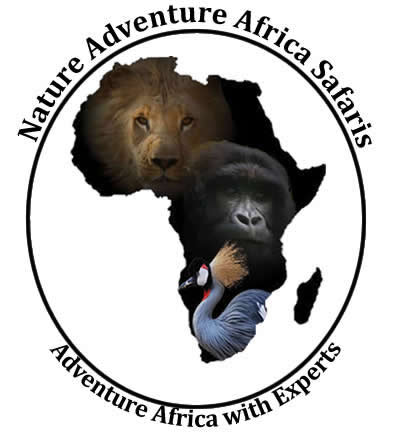Kibale Forest National Park is one of the top touristic destinations in Uganda. The Park is best known as a home of the common chimpanzees, and it resides more chimpanzees than any other Park in East Africa. The most popular attractions in this Park are of course the chimpanzees and the activity of tracking these great apes is one of the most sought after safari activities in the tourism industry of Uganda. A plethora of tourists throng the western region of Uganda, where the Park nestles, to take pleasure in tracking these man-friendly creatures, and it’s always great fun!
Chimpanzee tracking:
Tracking the chimpanzees is one of the best activities in Uganda and it offers a memorable trip in the mighty ‘Pearl of Africa’. The tracking expeditions in Kibale start with briefings at the starting point, Kanyanchu, which is about 45 minutes’ drive from Fort Portal – the nearest big town. To track the chimpanzees in Kibale you should however buy a chimpanzee tracking permit which you will show up at the starting point before entering the rain forests of Kibale to track these amazing creatures. The permits are annually on a high demand and hence you are emphasized to book as earlier as you can through your trusted tour operator. With effect from July 2020, the chimpanzee permit of Kibale will cost US$ 200 but as of current it still costs US$ 150.
Chimpanzee tracking is done in the morning and evening hours. The morning session starts at 8am well as the evening one starts at 2pm. The morning session of tracking the chimpanzees is the best because you may find them still asleep or while they are just leaving their nests, which makes it easy to see them. But the evening tracking can be tricky and very tiresome as you will need to track for so long to find the chimpanzees which would have left their nests to other areas of the Park.
Kibale is the best national park in Africa for the chimpanzee tracking expeditions and primate safaris entirely. The Park also inhabits 12 other primate species besides the chimpanzees, making a total of 13 primate species, more than any other Park in Africa. The other primate species in Kibale Forest National Park are; olive baboons, red tailed monkeys, L’Hoest’s monkeys, vervet monkeys, black and white Colobus, red Colobus monkeys, Uganda mangabey, blue monkeys, Thomas galagos, eastern/elegant clawed galagos, Demidoff’s galagos, and Potos.
Chimpanzee habituation:
Kibale Forest National Park is the only Park in East Africa where a chimpanzee lover can spend more than one hour with the primates. The chimpanzee tracking experience is very memorable but chimpanzee habituation experience is more memorable because you will spend more hours with the chimpanzees, unlike in the tracking expeditions where you will be allowed to spend only one hour with the primates. With chimpanzee habituation, you stay with the chimpanzees almost the entire day with the researchers who habituate – make them familiar to human presence. So it will depend on the time you have and what you prefer most between the chimpanzee tracking and chimpanzee habituation expeditions, the pick is yours!! However, since you are spending much time with the chimps, chimpanzee habituation costs a bit expensive as compared to tracking.
A chimpanzee habituation permit in Kibale currently costs US$ 200 but it will cost US$ 250, with effect from July 2020. All the permits are booked prior to your exact travel dates, for better planning of your trip, therefore send money in time to your trusted tour operator. However, to take note of: the Chimpanzee Habituation Experience is not for the faint of heart – it means an early breakfast – a packed lunch and you are off before dawn breaks into the forest. You meet your guide and you are off to where the chimpanzees built nests the night before. Dawn is just breaking and the chimpanzee community you are going to be with the rest of the day is rising from their sleep. The search for chimpanzees is also more strenuous because you are tracking the wild chimps which they just want to make familiar to human presence, so they will keep running away whenever they see you going close to their nests. Therefore you are advised to opt for the chimpanzee tracking experience if you are not aggressive enough because habituation calls for more effort.
